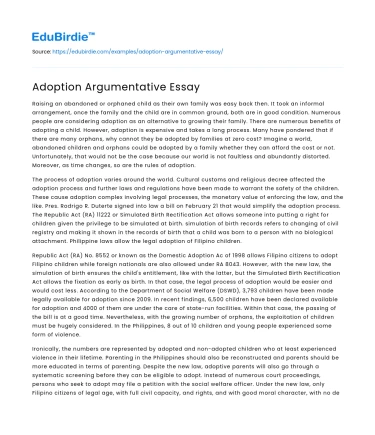Raising an abandoned or orphaned child as their own family was easy back then. It took an informal arrangement, once the family and the child are in common ground, both are in good condition. Numerous people are considering adoption as an alternative to growing their family. There are numerous benefits of adopting a child. However, adoption is expensive and takes a long process. Many have pondered that if there are many orphans, why cannot they be adopted by families at zero cost? Imagine a world, abandoned children and orphans could be adopted by a family whether they can afford the cost or not. Unfortunately, that would not be the case because our world is not faultless and abundantly distorted. Moreover, as time changes, so are the rules of adoption.
The process of adoption varies around the world. Cultural customs and religious decree affected the adoption process and further laws and regulations have been made to warrant the safety of the children. These cause adoption complex involving legal processes, the monetary value of enforcing the law, and the like. Pres. Rodrigo R. Duterte signed into law a bill on February 21 that would simplify the adoption process. The Republic Act (RA) 11222 or Simulated Birth Rectification Act allows someone into putting a right for children given the privilege to be simulated at birth. simulation of birth records refers to changing of civil registry and making it shown in the records of birth that a child was born to a person with no biological attachment. Philippine laws allow the legal adoption of Filipino children.
Save your time!
We can take care of your essay
- Proper editing and formatting
- Free revision, title page, and bibliography
- Flexible prices and money-back guarantee
Republic Act (RA) No. 8552 or known as the Domestic Adoption Ac of 1998 allows Filipino citizens to adopt Filipino children while foreign nationals are also allowed under RA 8043. However, with the new law, the simulation of birth ensures the child's entitlement, like with the latter, but the Simulated Birth Rectification Act allows the fixation as early as birth. In that case, the legal process of adoption would be easier and would cost less. According to the Department of Social Welfare (DSWD), 3,793 children have been made legally available for adoption since 2009. In recent findings, 6,500 children have been declared available for adoption and 4000 of them are under the care of state-run facilities. Within that case, the passing of the bill is at a good time. Nevertheless, with the growing number of orphans, the exploitation of children must be hugely considered. In the Philippines, 8 out of 10 children and young people experienced some form of violence.
Ironically, the numbers are represented by adopted and non-adopted children who at least experienced violence in their lifetime. Parenting in the Philippines should also be reconstructed and parents should be more educated in terms of parenting. Despite the new law, adoptive parents will also go through a systematic screening before they can be eligible to adopt. Instead of numerous court proceedings, persons who seek to adopt may file a petition with the social welfare officer. Under the new law, only Filipino citizens of legal age, with full civil capacity, and rights, and with good moral character, with no declaration of any crime and no psychological and emotional impairment, capable of caring and supporting for rearing a child. These are the requirement made to secure the safety of the child. Moreover, parenthood must be also emphasized in the Philippines. Disciplining a child does not include violence. Violence and discipline are not in good correlation. In another study, there are growing numbers of orphans and it is estimated between 143 million and 210 million around the world.
The Philippines alone has estimated 1.8 million children are orphans or have lost one parent. As a result, children are engaged in child labor in order to survive. With the advantage of a convenient process of adoption, it would benefit the children and couples or families in need. Adoption also epitomizes a way of providing the biological parents of a child. Instead for an orphan to be left and forced to child labor. The adoptive parents provide the basic necessities for the child. As for the adopting parents, in cases, they are not able to reproduce, their lives can be meaningful in having a child through adoption. The growing number of helpless children can lessen. Regardless of the bill to make adoption easier, it is important to ensure the safety of the children being adopted. In conclusion, the passing of the Simulated Birth Rectification Act benefits the country. The legal process cost less and not as much time. Both people would be in common ground and a double-win situation. The orphan would be taken off by a family. As well as couples or families would be fulfilled by adopting and raising a child as a legitimate family member. Aside from the evident positive effects, through adoption, there will be reduced foster care and cost in the brief. In the long duration, there would be betterment for all, especially for the youth.






 Stuck on your essay?
Stuck on your essay?

